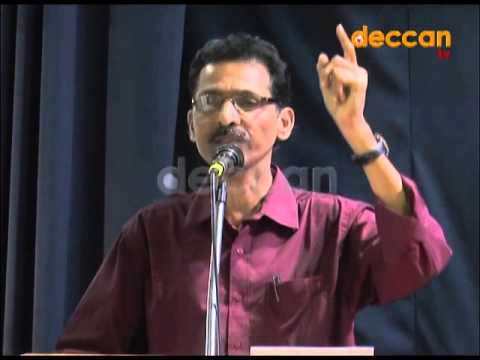By :nvenugopal61@gmail.com :Putting Government of Telangana to severe embarrassment, Andhra Pradesh High Court has struck down a government order that was issued a year ago and made grave observations. The impugned GO No. 123 was issued on 30.7.2015, amended with GO No. 190 dated 7.10.2015 and GO No. 214 dated 28.11.2015, and has been in operation with dozens of notices served under it. Now, with the High Court verdict, the GO stands cancelled. It is reported that GoT is contemplating to appeal against the verdict either to Division Bench or to Supreme Court.
But an appeal and further arguments will only embarrass it more and show it in much more bad light. In all probability, GoT may be slapped once again at a higher level. Because the struck-down GO is ethically, legally and politically untenable.
Let us begin with the political ramifications: the Chief Minister and the Irrigation Minister have more than once on record declared that they do not have any objection to use the 2103 Act or GO No. 123, whatever the people wish. At least some land owners who approached the court have categorically stated that they don’t want GO 123 and indeed they were giving expression to thousands of other landholders. The court, among other things, accepted their plea. If the powers that be have any sense of adhering to their own words they should desist from appealing against the verdict and stick to implementing the 2013 Act, which they themselves were saying yesterday. If they go for an appeal, it will give an indication that their earlier statement was an act of doubletalk.
Then coming to the legal aspects: The Government of Telangana’s G.O. No. 123 was based on Section 107 of the Right to Fair Compensation and Transparency in Land Acquisition,
Rehabilitation and Resettlement Act, 2013 (popularly the LARR Act or the 2013 Act), which said: "107. Nothing in this Act shall prevent any State from enacting any law to enhance or add to the entitlements enumerated under this Act which confers higher compensation than payable under this Act or make provisions for rehabilitation and resettlement which is more beneficial than provided under this Act".
This Section clearly shows that any state government will have a right to set aside the 2013 Act only when it strives to “enhance or add to the entitlements enumerated” under the Act, in order to “confer higher compensation” or “make provisions for rehabilitation and resettlement which is more beneficial”.
However, the GO 123 had subverted this spirit and direction of the 2013 Act in every onceivable way: It does not "enhance or add to the entitlements". Indeed, it neither talks of enhancement nor mentions any entitlements. The GO simply puts the complete onus on the land holder and says it is the landholder who is a willing seller of his land to the government for “public purpose”, a vague and ambiguous expression which can mean anything. In contrast, the 2013 Act seeks recording the specific purpose for which the land is acquired and it also stipulates that if the purpose is not served, the land should be returned to the original land holder.
The GO 123 does not even mention "compensation", leave alone "higher compensation" as stipulated by the 2013 Act. The GO only talks about “the value of land and property, perceived loss of livelihood” only. “In the first version “equivalent costs required for rehabilitation and resettlement” was there but the subsequent G.O. 214 deleted those words.
Compared to the stipulations of the 2013 Act, the consideration that GO 123 wants to pay is actually insignificant. Not only that, while the 2013 Act talks in detail about compensation, rehabilitation and resettlement of landless and all those depend on agriculture, GO. 123 talks about only “willing land owners”.
While the 2013 Act is a detailed legislation with 114 sections and four schedules stretching to 60 pages, the GO 123 is a three-page note with two sections and another three-page annexures of two agreement forms. While the 2013 Act lays down many restrictions on the governments and corporate companies in acquiring land under Social Impact Assessment, Environmental Impact Assessment, Independent Experts’ Committee approval on the project,approval in Gram Sabha and Panchayat, punishment to public servants if they acquire land by misleading and with false information, etc, G.O. 123 does not even consider any of these precautions.
In one word, GO 123 and 214, between them, attempt to leave land owning peasants as beggars at the mercy of the government. The fate of landless labourers and artisan castes dependent on agriculture are not even considered. Thus G.O. 123 is against the spirit of the 2013 Act and inhuman on several counts.
It would be better if the government desists from appealing against the High Court verdict to rejuvenate the unjust G.O. Let G.O. 123 die its natural death.
nvenugopal61@gmail.com

